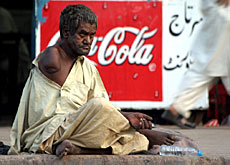
Leaders urged to tackle global issues

World leaders are breaking their promises to tackle global problems ranging from poverty to protecting the environment, a report says.
The Geneva-based World Economic Forum (WEF) published the report by the Global Governance Initiative (GGI) on Monday, in the run-up to the WEF annual meeting in Davos.
This year’s WEF meeting, which begins on Wednesday, takes as its main theme: Taking Responsibility for Tough Choices.
The GGI report, whose findings will be discussed in Davos, assesses the efforts of governments and corporations over the past year, and concludes that the world “remains far off track” when it comes to achieving key goals.
In a set of scores on a scale of zero to ten, it says both public and private sector leaders have “earned failing grades”.
However, it adds that 2005 could prove to be the “year of change” – especially if the formidable energies of private enterprise are harnessed more effectively.
Less than half
The authors say that, on a range of issues ranging from education via hunger to peace and human rights, global leaders are doing less than half of what is needed to build a more stable, prosperous world.
Although responsibility rests primarily with governments, they argue that global aims – such as the United Nations Millennium Goals – cannot be reached without the active participation of the private sector.
The UN is due to hold a summit in New York next September to review progress towards the Millennium Goals, which were set in 2000 with a target date in many cases of 2015.
The report says business can contribute in four specific ways: by developing new products; by “hybrid” business-philanthropic activities; by “strategic corporate philanthropy”, and by
“responsible engagement in public policy dialogue, rule-making and institution-building”.
Project director Ann Florini, senior fellow at the US-based Brookings Institution, says: “Economic integration, political liberalisation and technological innovation are creating all the right conditions for humanity to do much better.
“But the opportunities could all too easily slip through our fingers. This report shows not only what we are leaving undone, but what we can do now.”
Make-or-break
Richard Samans, managing director of the WEF Global Institute for Partnership and Governance, says 2005 will be a “make-or-break year” for the UN Millennium Goals.
“Many of the goals have a deadline of 2015. If the international community is going to take them seriously, it needs to begin applying much greater effort and partnership now,” he said.
The report points out that the response by international corporations to the tsunami disaster shows that the private sector has much to contribute towards global goals.
Gareth Evans, president of the International Crisis Group and chairman of the GGI’s expert group on peace and security, says: “The tsunami has been the world’s first truly global catastrophe, dwarfing any other single event in the emotion and support it has generated.
“It has also demonstrated graphically that we are indeed one human family, ever more susceptible to common risks and with a shared responsibility to tackle them.”
At a conference in Geneva this month, around 70 nations including Switzerland agreed to donate $717 million (SFr846 million) to the UN appeal, in a bid to speed up relief efforts.
swissinfo
The World Economic Forum’s Global Governance Initiative monitors international progress in implementing the social, economic and environmental goals set forth in the United Nations Millennium Declaration and other documents.
Goals include:
Eradication of poverty and hunger
Achieving universal primary education
Equality of the sexes
Reducing child mortality
Improving maternal health
Combating HIV/Aids, malaria and other diseases
Ensuring environmental stability
Preparing a global strategy for development
A report published by the World Economic Forum takes world leaders to task for not carrying out their promises to tackle global problems.
Compiled by the Global Governance Initiative, it reports that leaders are doing less than a half of what is needed to build a more stable, prosperous world.
The GGI report will be a subject of discussion in Davos at the WEF’s annual meeting, which begins on Wednesday.

In compliance with the JTI standards
More: SWI swissinfo.ch certified by the Journalism Trust Initiative






























You can find an overview of ongoing debates with our journalists here . Please join us!
If you want to start a conversation about a topic raised in this article or want to report factual errors, email us at english@swissinfo.ch.